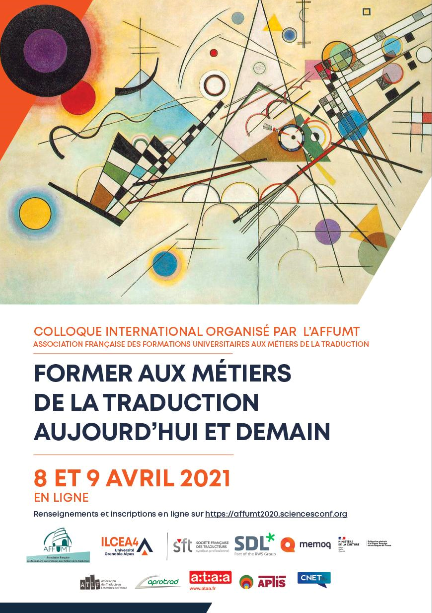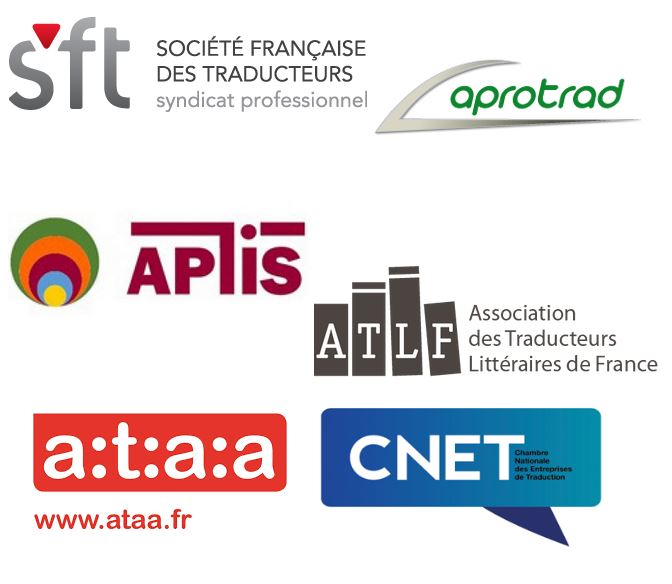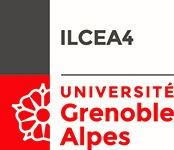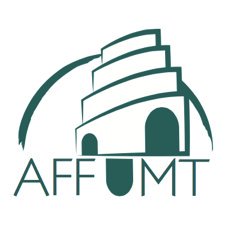Registration is no longer possible.
International conference organised by the AFFUMT (Association française des formations universitaires aux métiers de la traduction / French Association for University Translator Training Programs)
“Translator Training: From the present to the future”
8-9 April 2021

University translator training programs must keep up to date in order to prepare students for a successful career in a rapidly evolving sector. Developments in the early 21st century have made the need to adapt more urgent than ever: CAT tools and the Internet have radically changed translators’ working methods, while machine translation and now neural machine translation have altered both how translators approach their work and how they are paid. At the same time, ‘soft’ or interpersonal skills have come to be increasingly valued. More than ever, trainers need to consider the future needs and requirements of trainee translators and to update their programs accordingly.
The question of how best to train language industry professionals is far from new, and has given rise to an extensive academic literature, to a range of experimental approaches (such as project-based learning, classroom simulation of translation agencies, and workshops comparing human translation to post-edited machine translation), and to the creation of networks and projects focusing on these questions, such as OPTIMALE, OTCT and INSTB. For more than a decade, the European Commission’s Directorate-General for Translation (DGT) has used the European Masters in Translation (EMT) network as a platform to define an evolving skills framework for future translators, focusing on language transfer, service provision, translation technologies and interpersonal relations.
Against this background – and in keeping with its mission, since 2002, to promote, defend and professionalise university translator training programs – the AFFUMT is organising its inaugural international conference focusing on issues surrounding translator training, in the present and for the future.
Proposals (500 words, 5 references maximum) should focus on issues encountered in preparing students for the range of careers and specialities encountered in the translation and language industries. Possible topics include translation, localisation, post-editing, proofreading, transcreation, interpreting, technical writing, multimedia content creation, précis writing, terminology, and project management. Common themes include the didactics of translation, the development of professional skills, ergonomics for translators, CAT tools, machine translation, the role of translation studies research in translator training, and the role of continuing education for professional translators.
This conference is organised in honour of Elisabeth Lavault-Olléon, Emeritus Professor in translation studies at the Université Grenoble Alpes, where a new impetus was given to the association on 30 April 2010.
Key Dates:
Call for papers: May 2019
Deadline for submission of abstracts: from 15 September 2019 to 6 January 2020.
Notification of acceptance: early March 2020
Conference : 25-26 May 2020 8-9 April 2021
Abstracts should be submitted on this website. To do so, you need a sciencesconf account. If you do not have one, you can create one very quickly: just go to Login and then Create account (top right of the screen). Once this is done, you may submit your proposal (New submission, left side of the screen).
Keynote speakers:
Yves Gambier, Université de Turku
Dorothy Kenny, Dublin City University
Gary Massey, ZHAW Zurich University of Applied Sciences
Round table :
A round table with different associations is scheduled on the Thursday afternoon: Société française des traducteurs (SFT), Association des traducteurs littéraires de France (ATLF), Association professionnelle des métiers de la traduction (Aprotrad), Association des traducteurs/adaptateurs de l'audiovisuel (ATAA), and Association of programmes in translation and interpreting studies (APTIS), Chambre nationale des entreprises de traduction (CNET)

Scientific committee:
Pierrette Bouillon, Université de Genève
Nadine Celotti, Università degli studi di Trieste
Dragoș Ciobanu, University of Leeds
Isabelle Collombat, Université Sorbonne Nouvelle - Paris 3 (ESIT)
Fayza El Qasem, Université Sorbonne Nouvelle - Paris 3 (ESIT)
Georges Fournier, Université Lyon III
Cécile Frérot, Université Grenoble Alpes
Nicolas Froeliger, Université de Paris
Anca Greere, Babeș-Bolyai University
Amparo Hurtado Albir, Universitat Autònoma de Barcelona
Katell Hernandez Morin, Université de Rennes II
Amélie Josselin-Leray, Université Toulouse Jean Jaurès
Nike K. Pokorn, University of Ljubljana
Elisabeth Lavault-Olléon, Université Grenoble Alpes
Rudy Loock, Université de Lille
Christine Michaux, Université de Mons
Enrico Monti, Université de Haute-Alsace
Jean Quirion, University of Ottawa
Andrew Rothwell, Swansea University
Tomas Svoboda, Univerzita Karlova
Sonia Vandepitte, Ghent University
Alain Volclair, Université de Strasbourg
Organising committee
AFFUMT Board
Nicolas Froeliger
Katell Morin-Hernandez
Amélie Josselin-Leray
Rudy Loock
Enrico Monti
ILCEA4 - GREMUTS, Université Grenoble Alpes
Pauline Bureau
Alice Carré
Sarah Daniel
Marie-Hélène Fries
Wenjie Hong
Luz Martinez
Thierry Nallet
Emanuela Nanni
Caroline Peynaud
Caroline Rossi
Inesa Sahakyan
Aurélien Talbot
Séverine Wozniak

Languages of the conference:
English and French
Publication:
A selection of presented papers will be considered for publication.
References:
ABOU FADEL Gina, DELISLE Jean, AWAISS Henri et Sleiman AL ABBAS (2004). Traduction : La formation, les spécialisations et la profession, Beyrouth, Université Saint-Joseph, Faculté des Lettres et des Sciences humaines, École de Traducteurs et d’Interprètes, coll. « Sources-Cibles », 250 p.
ANDERMAN Gunilla et Margaret ROGERS (2000): “Translator Training between Academia and Profession: A European Perspective”, in Schnäffer C. & B. Adab (eds) Developing Translation Competence, Amsterdam, Philadelphie : John Benjamins, pp. 63-73.
BALLARD, Michel (1995). “Histoire et didactique de la traduction”, TTR, vol.8 n°1, pp. 229-246.
BALLIU, Christian (ed.) (2005). « Enseignement de la traduction dans le monde / Teaching Translation throughout the World ». Numéro spécial de Meta, vol.50, n°1.
DELISLE, Jean et Hannelore LEE-JAHNKE (1998) : Enseignement de la traduction et traduction dans l’enseignement, Presses de l’Université d’Ottawa.
DOHERTY, Stephen et Dorothy KENNY (2014). “The design and evaluation of a Statistical Machine Translation syllabus for translation students’, The Interpreter and Translator trainer 8 (2): 295-315
GAMBIER, Yves (2012). « Enseigner la traduction / Former les traducteurs [Teaching translation / Training translators], Handbook of Translation Studies, John Benjamins, vol. 3, pp. 163-171.
GILE, Daniel (1995). Basic Concepts and Models in Interpreter and Translator Training. Amsterdam/Philadelphia: John Benjamins.
GOUADEC, Daniel (ed.) (2000). Formation des traducteurs. Actes du Colloque international de l’Université Rennes II, Rennes, 24-25 septembre 1999, Paris: Maison du Dictionnaire.
GOUADEC, Daniel (2002). « Former de vrais professionnels », in Traduction, terminologie, rédaction : Actes du colloque international sur la traduction spécialisée, Rennes, Paris, Maison du Dictionnaire, pp. 245-253.
HUNG, Eva (ed.) (2002). Teaching Translation and Interpretation 4: Building Bridges. Amsterdam / Philadelphie : John Benjamins.
HURTADO ALBIR, Amparo (2007). “Competence-based curriculum design for training translators.” The Interpreter and Translator Trainer 1 (2), 163–195
ISRAËL Fortunato (ed.) (1998). Quelle formation pour le traducteur de l'an 2000 ?, actes du colloque international tenu à l'ESIT les 6, 7 et 8 juin 1996, Paris, Didier érudition.
KELLY Dorothy (2005). A Handbook for Translator Trainers, Manchester: St Jerome Publishing, Translation Practices Explained: Volume 10, second edition.
KENNY, Dorothy (1999). ‘CAT Tools in an academic environment: What are they good for?”, Target, 11 : 65-82.
KENNY, Dorothy (2019). ‘Technology in Translator Training’ in Minako O’Hagan (eds). The Routledge Handbook of Translation Technology. London and New York: Routledge.
KIRALY, Donald C. (2000). A social Constructivist Approach to Translator Education: Empowerment from Theory to Practice. Manchester: St. Jerome Publishing.
KUSSMAUL, Paul (1995). Training the Translator. Amsterdam/Philadelphia: John Benjamins
LAVAULT-OLLEON Élisabeth & Lafon Michel (éds.) 1999. « Le traducteur, de l’édition à l’université - Pratiques professionnelles et pratiques d’enseignement », Les Cahiers de l’ILCE, n° 1, Université Stendhal Grenoble, 129 p.
LAVAULT-OLLEON Élisabeth et Alice CARRE (2012). « Traduction spécialisée : l’ergonomie cognitive au service de la formation », in ASp, 62, pp. 67-77.
LAVAULT-OLLEON Élisabeth (2007). « Traduction spécialisée : des pratiques qui se passent de théorie ? » in Traduction spécialisée : pratiques, théories, formations, E. Lavault-Olléon (éd.)
LAVAULT-OLLEON, Elisabeth (éd.) (2007) Traduction spécialisée. Pratiques, théories, formations. Bern: Peter Lang.
MARESCHAL, Geneviève, BRUNETTE, Louise, GUEVEL, Zélie & Valentine, EGAN (éd.) (2003). La formation à la traduction professionnelle. Ottawa: Presses de l’Université d’Ottawa.
MASSEY, Gary (2005). “Process-Oriented Translator Training and the Challenge for E-Learning”. Meta, 50 (2), 626–633.
PYM, Anthony, C. FALLADA, J. RAMON BIAU & J. ORENSTEIN (2003): Innovation and E-Learning in Translator Training: Reports on Online Symposia, Tarragona: Universitat Rovira I Virgili.
PYM, Anthony (2005). "Training translators—Ten Recurrent Naiveties." Translating Today 2, 3-6.
SACHINIS, Michail (ed) (2011), Special issue: “Translator training, consecutive interpreting, localization”, JosTran, vol 16, juillet 2011.
SEWELL, Penelope et Ian HIGGINS (1996). Teaching Translation in Universities. Present and Future Perspectives. London : CILCT.
TENNENT, Martha (ed.) (2005). Training for the New Millenium, Pedagogies for Translation and Interpreting. Amsterdam/Philadelphia: John Benjamins
VENUTI, Lawrence (ed.) (2017). Teaching translation. Programs, Courses, Pedagogies, Londres / New York : Routledge.





